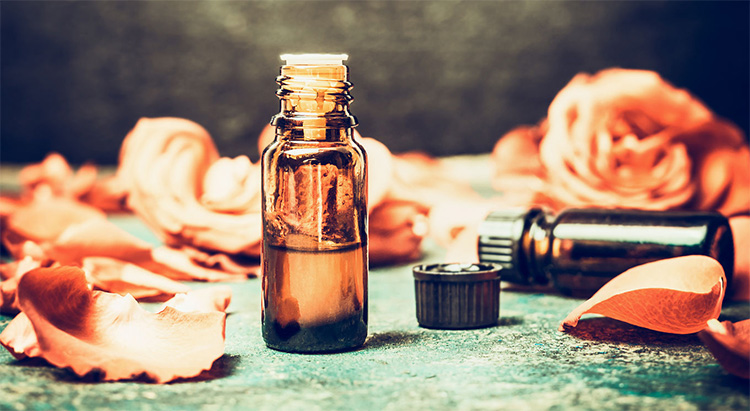Cleaning and Reusing Essential Oil Bottles

Most essential oils are stored in amber or cobalt glass bottles. Once I finish a bottle of essential oil or absolute, I try to clean and reuse these glass bottle whenever possible.
However, essential oils and absolutes vary in viscosity (thickness). They can leave a sticky film on the inside of your glass bottles that can be impossible to clean with just soap and hot water. Sterilizing/boiling them also doesn't always get rid of all essential oil residue. Before explaining the trick to cleaning essential oil bottles, I want to stress that it's not always possible to fully clean an essential oil bottle, and sometimes the effort just isn't worth it. If you can't completely eliminate the residue, I don't recommend reusing the bottle because the oxidized residue can potentially contaminate the fresh oil decanted into the bottle.
The trick to cleaning the inside of glass essential oil bottles is to use a safe "solvent" that will dissolve the essential oil that remains in the bottle without leaving any residue from the solvent behind. High proof vodka is readily available and is a good choice to use as the solvent for this purpose. Rubbing alcohol, denatured alcohol and methylated spirits may work (it depends on the percentage of alcohol present in the product and different areas of the world have different options available), but I prefer to use high proof vodka for this as it does not contain additives that could be left behind, even after washing afterwards. To conserve on vodka when cleaning larger bottles, fill the bottle at least half way, and let it sit for a few days. Every few hours or so, shake the bottle very well (with cap on). Fill small bottles completely (no need to shake).
Depending on how "gunky" the bottles are that you are cleaning, you can reuse the vodka to clean additional bottles. Do not consume the vodka mixture when you're done.
Using an appropriately sized bottle brush can help loosen sticky essential oil residue. Be careful not to let the mixture splash out of the bottle. You don't want to get the vodka or essential oils in your eyes.
You can remove old labels from your essential oil bottles as you would any other labels that you come across. Soaking the exterior of the bottles in high proof vodka helps to get rid of stubborn labels.
Be sure you also thoroughly scrub and soak the orifice reducers and caps as well. Orifice reducers (also known as dropper inserts) can be the trickiest to clean. When in doubt, I do not reuse them.
Amber or cobalt glass bottles can also be sterilized in a manner similar to that of sterilizing baby bottles. I don't usually bother with sterilizing them since I only reuse bottles for particular diffuser and other blends that don't require especially pristine storage conditions (see below).
Remember that alcohol and essential oils are flammable.
Suggestions
- I never use recycled bottles to store more precious oils or oils that I intend to specifically use for topical or therapeutic purposes. I tend to "downgrade" the bottles that I clean and reuse to only store blends intended for my diffuser or for blends that I use for laundry or cleaning purposes. I avoid reusing bottles for precious, topical or therapeutic blends.
- If a bottle originally contained an essential oil that is considered sensitizing to the skin (i.e. cinnamon), play it safe and don't reuse the bottle to store an essential oil that you plan to use for topical blends.
- If a bottle is especially sticky and will cost more in vodka to clean than the bottle is worth, I'll set it aside for recycling.
Please pin or share the below image:
